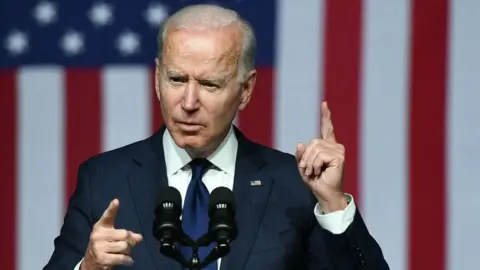US delays tariffs in 'tech tax' row
 Getty Images
Getty ImagesThe US has announced and immediately suspended tariffs on about $2bn (£1.4bn) of imports in retaliation for taxes on its tech firms.
The 25% tariffs apply to certain goods from the UK, as well as Austria, India, Italy, Spain, and Turkey.
US Trade Representative Katherine Tai said the delay would allow more time for discussions on tax.
"The US remains committed to reaching a consensus on international tax issues," she said.
It comes after a year-long US investigation into digital services taxes put in place by the six countries, which tax tech firms on their revenues, rather than profits.
Washington previously described the taxes as "unreasonable" and "discriminatory" against American social media companies, online marketplaces and tech firms.
The US government said it will approve the threatened tariffs on $887m of UK goods, as well as on $383m of Italian goods and $323m of Spanish products.
In addition it will impose tariffs on $118m of goods from India and $65m worth of products from Austria.
But it suspended the introduction of the tariffs immediately for up to 180 days as talks on how to tax tech companies with a global footprint continue in the G20 and the Organisation for Economic Co-operation and Development (OECD).
"The US is focused on finding a multilateral solution to a range of key issues related to international taxation, including our concerns with digital services taxes," said Ms Tai.
But she noted that it still had the option to impose the charges.
"Today's actions provide time for those negotiations to continue to make progress while maintaining the option of imposing tariffs... if warranted in the future," she said.
Under the proposals, the UK would face extra duties on goods including make-up, perfume, coats, ceramics and some types of toys, according to US Trade Representative documents.
At the Budget, the Office for Budget Responsibility calculated the digital services tax would raise £300m in the current financial year, and as much as £700m in future years.
It was introduced in the UK last April and taxes at 2% the revenues of tech companies who derive value from UK users.
It followed years of claims in Europe and elsewhere that big tech firms do not pay enough tax in the countries where they operate.
Last August, Facebook agreed to pay the French government €106m (£95.7m) in back taxes to settle a dispute over revenues earned in the country.
Earlier in 2020, Facebook boss Mark Zuckerberg said he recognised the public's frustration over the amount of tax paid by tech giants.
